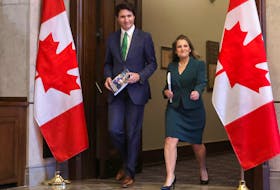On Oct. 21, Canadians once again went to the polls to decide who would form government. By the end of the night, it was decided that Prime Minister Justin Trudeau would form a minority government.
When looking at the key pieces of each campaign, there was a startling lack of seriousness regarding deficit spending.
In the 2015 election, having a balanced budget was of high importance. After years of deficit spending following the global recession, our country was finally in a position to start winding back on the deficits and begin balancing the books and paying down the debt.
In that election, we saw former Prime Minister Stephen Harper present a balanced budget plan, as did Tom Mulcair and the NDP. Justin Trudeau’s Liberals presented the risky plan to run “modest” deficits for three years before returning to balance in 2019.
That never happened, and the modest deficits doubled.
Economists never fully agree, but in 2015 when the economy was slowing, it was Trudeau’s plan that seemed to make the most sense. Canadians agreed by awarding the Liberals with a majority.
So where are we in 2019, when the economy has in fact been doing well since the 2015 election?
We have been in a period of constant spending, ignoring the very principle of spending during slow growth periods to stimulate the economy and reining in spending during the good times.
The very core of the problem is the same in Newfoundland and Labrador.
We have become comfortable living within a culture of debt. Money is not free and that is why the second largest expenditure in our province is servicing the debt; 18 cents of every tax dollar this year is going to debt charges and other financial expenses, which is money that could be far better spent on education, infrastructure, or tax reduction.
As the credit rating agencies have noted, balancing the budget in 2022/2023 is a longshot in Newfoundland and Labrador. Government has become dependent on constantly running deficits as opposed to getting its act together by tightening its belt and saying no to the status quo.
The path that we are on is not sustainable and Newfoundlanders and Labradorians want our governments, federally and provincially, to take decisive action on tackling their deficits.
Passing along the debt for the next generation to pay shows a lack of courage to tackle the big problem. From 1980 to 2019, there has been a budget surplus for only seven of 39 years. The St. John’s Board of Trade has maintained for years that the government of Newfoundland and Labrador has a spending problem and not a revenue problem.
We chose to not rein in spending during our good times as a province. We chose to keep spending and for the past several years we have been living on the provincial credit card.
The debt culture has permeated our politics.
Kicking the can further down the road will create an absolute mess for the next generation who will inherit the fiscal woes of the province.
The people of our province want to see a Newfoundland and Labrador that thrives, and that cannot be accomplished by continuing the status quo and handcuffing our future to debt servicing.
We’re all in this together, and we need to start addressing this debt together before it becomes too crushing to manage.
Janis Byrne is chair of the St. John’s Board of Trade
RELATED:








